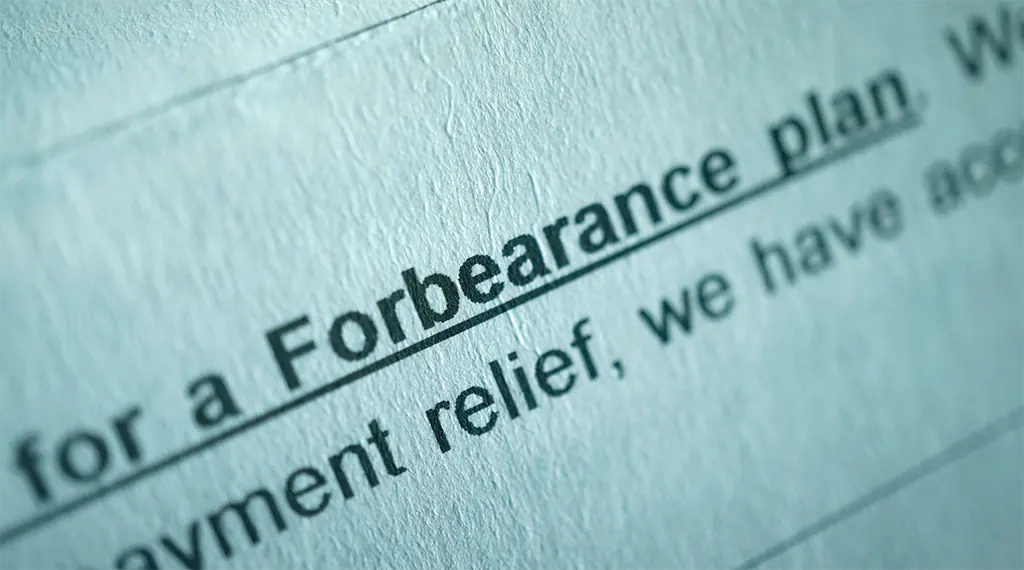UPDATED: May 2, 2022

No one buys a home with an expectation to ever request a mortgage forbearance on it. But the reality is, when you buy a home you’re typically locking yourself into either a 15 or 30 year mortgage. It’s impossible to predict all the curve balls life will throw at you throughout either time frame, and you may find yourself in a challenging financial position.
If that is the case and foreclosure seems like the only option, don’t give up hope! Mortgage forbearance can help you keep your home and ease the financial pressure you're currently facing.
Table of Contents
What Exactly is Mortgage Forbearance?
A mortgage forbearance is when your loan company agrees to put a temporary pause on your monthly mortgage payments as you go through a short-term crisis that disrupted your financial situation.
Who Should Consider Using a Mortgage Forbearance?
Any homeowner going through financial hardship should consider using a mortgage forbearance option.
If you happen to become sick, lost a job, have a disability, had a death of a wage earner in the family, are overcoming a recent disaster, etc, you may be a candidate for a mortgage forbearance.
For example, if you were in an accident and were unable to work for 90 days, a mortgage forbearance may be the perfect option for you. If you didn’t have a savings account to live off of and pay your living expenses, a mortgage forbearance would allow you to skip your mortgage payments for a specific period of time as you work on getting your financial situation back on track.
A mortgage forbearance is designed to provide the homeowner with extra breathing room as the homeowner works on stabilizing their financial life. It is not a loan forgiveness program.
FREE Mortgage/Refi Quotes Comparison
Compare Multiple Offers Instantly
How to Apply & How Does it Work
If you believe you need to move forward with a mortgage forbearance program, the first step would be to contact your mortgage company or bank and be transparent about your current financial situation.
From there, you will have to qualify. Each lender may have their own qualification requirements.
Additionally, there are different types of forbearance options, depending on if you have a government-backed, or privately-owned mortgage. Check with your lender to see what options exist for you
Typically, a forbearance can be up to 3 months long. However, be sure to check with the lender if there are any current programs that exist to extend the 3 month forbearance period if needed. For example, under the CARES act, the government extended this time frame to 6 months.
You Still Owe the Money
A mortgage forbearance doesn’t give you a permanent pause on mortgage payments, nor does it forgive the debt for the period your mortgage was in forbearance. You will still owe the money for the period of time your loan payments were suspended.
Some lenders will ask to be repaid via a short-term repayment plan. Other lenders may choose to add whatever you owe to the back of your mortgage.
For instance, if at the time of the forbearance you had 180 months left on your mortgage, and you took a 3 month forbearance period, when your payments resume you will have 183 months left on your mortgage.
Everyone Doesn’t Qualify for a Mortgage Forbearance
You can’t spend money recklessly and look at a mortgage forbearance as a fall back option. A homeowner needs to provide the facts and proof of certain life qualifying events to be eligible.
Not the Only Option
Mortgage forbearance is a great tool, and can be incredibly useful if one ever needed it. However, there are other options you may want to consider before moving forward.
If making your monthly mortgage payment is difficult, look at all of your other bills and debt obligations. Perhaps your car lease or finance charge on your vehicle is stretching you too thin. Getting a less expensive car can be more practical, and an easier option, to move forward with.
Additionally, before choosing to pursue one, look into refinancing your mortgage. If you’re currently paying a high interest rate on your mortgage, refinancing into a lower interest rate loan can save you hundreds of dollars per month.
Credit Score
A mortgage forbearance will hit your credit report, unless your loan company has agreed not report it. However, a forbearance doesn’t negatively impact your credit score as much as missed mortgage payments.
A forbearance period can also be explained, which can be taken into consideration on future loans or credit checks.
Summary
A mortgage forbearance is designed to keep a homeowner from defaulting on their loan, and potentially losing their house. If the homeowner qualifies, the mortgage lender will provide a temporary relief program on the monthly mortgage payments as the homeowner deals with the financial crisis they’re going through.
The homeowner can make reduced monthly mortgage payments, or skip them entirely, for a period of time. The payments aren’t forgiven, but rather deferred for a specific period of time.
Once the forbearance period if over, the homeowner will be responsible for repaying the amount that was skipped or reduced during the forbearance period.
This tool prevents many people from losing their home, and it can be life changing for you if you ever needed it.
Managing your finances proactively is always the best practice. One of the best ways to avoid having to deal with a mortgage forbearance at all is having a budget and well-funded emergency fund.
FREE Mortgage/Refi Quotes Comparison
Compare Multiple Offers Instantly






Leave a Reply